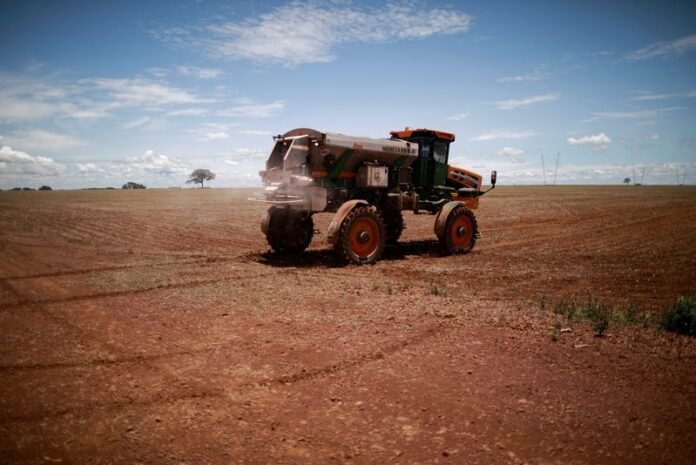By Ana Mano and Cassandra Garrison
SAO PAULO/MEXICO CITY (Reuters) -Latin American farmers are in for a rough ride if the U.S. slaps secondary sanctions on buyers of Russian exports, such as the fertilizers essential for cash crops from Mexican avocados to Brazilian soybeans and corn.
For farm powerhouse Brazil, which covered about a third of its fertilizer demand with $3.7 billion of imports from Russia last year, there is virtually no alternative to fill the gap if those flows are halted, experts and industry players said.
The 2022 outbreak of war in Ukraine triggered stockpiling of Russian fertilizer in the region. Prices soared briefly, but trade has now normalized. Plans to boost domestic fertilizer production in Mexico and Brazil have made slow progress in the face of relatively cheap Russian imports.
Shipments to Brazil, the world’s largest producer of soybeans, sugar and coffee, rose nearly 30% in the first half of this year, the Russian Fertilizer Producers Association said.
NATO Secretary General Mark Rutte singled out Brazil among a handful of countries that could be hit “very hard” by sanctions for doing business with Russia as part of U.S. President Donald Trump’s renewed push to end the war in Ukraine.
Fresh sanctions targeting Russian fertilizer imports could “render soybean and corn production inviable,” said Lucas Beber, vice president of Brazilian grain farming group Aprosoja.
Mexico also imported more than $580 million of fertilizers last year from Russia, its largest supplier according to government data. Potential U.S. sanctions would pose a big problem for farmers there. “It would affect Mexico’s purchases from Russia of different fertilizers, particularly urea, which is the most widely used in crops such as corn, sorghum, wheat, and even avocado,” said Raul Urteaga. A former director of international affairs for Mexico’s agriculture ministry, Urteaga warned of a drop-off in the quality of fertilizers available if Russian imports disappear. That could weaken avocado production and send prices higher for U.S. consumers. The U.S. accounts for more than 80% of Mexico’s total avocado exports, a market worth more than $3 billion last year, according to U.S. government data. “The price of avocados would increase if producers have to use other alternatives or find fertilizers that are imported from sources other than Russia,” Urteaga said.
Russia is also top fertilizer supplier for Colombia, another key producer of fruits, flowers and coffee to the U.S. Russia provides about a quarter of Colombia’s fertilizer imports, government data shows.
